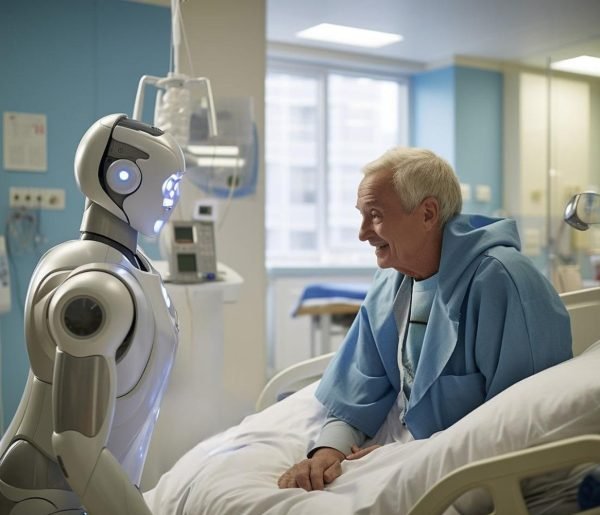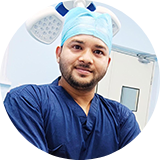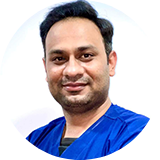Bharat Kare – Hernia Treatment
If you are looking for the best medical assistance for hernia treatment in India, we at Bharat Kare can offer you the best treatment approaches with supreme medical facilities!
Book an Appointment


HERNIA
It is a medical condition wherein a tear develops in your muscle or tissue, leading to some parts of internal organs coming out through a weak spot or muscle. Most hernias manifest inside the abdominal cavity in between the chest and the hip area. Some activities like lifting heavy objects/weights or bending, putting pressure on tissue through the weak spot, obesity, and multiple abdominal surgeries can put you at risk of hernia.
In some cases, you could see a hernia, but that depends on its location and its size. They occur, in most cases, in your groin or your abdominal area. A few common types of hernias to be witnessed are: inguinal (inner groin), femoral (outer groin), umbilical (belly button), incisional (from a previous surgical cut/incision/scar), and hiatal (upper belly). Out of these most common are inguinal and femoral.
Hernias should not be left untreated, as they can get bigger and can create life-threatening complications.
CAUSES OF HERNIA:
- An incision or scar from the previous surgery (if that disrupts the abdominal wall)
- Childbirth, pregnancy
- Constipation (strain during bowel movements makes muscles weak, leading to Femoral and inguinal hernias).
- Umbilical hernia (most common in infants due to childbirth).
- Strain from coughing (can lead to pressure on the abdominal or groin area).
- Heavy weight lifting, athletes
- Obesity
SYMPTOMS OF HERNIA:
- Epigastric hernia: The main symptoms of epigastric hernia are severe constipation, bloating, and difficulty urinating; this type is most common in adults.
- Femoral hernia: Being a rare type, this type does not cause more symptoms but can occasionally lead to severe complications.
- Hiatal hernia: When hernia pushes through the diaphragm and into the chest, disrupting the normal flow of food from the esophagus into the stomach. The muscles no longer function normally, as this usually closes the connection between the esophagus, leading to acid backflow and the birth of symptoms like chronic acid reflux and even oesophageal damage.
- Incisional hernia: This type can precisely develop after abdominal surgery; the most visible sign is a bulge near the incision/scar site causing symptoms like nausea, vomiting, abdominal discomfort and pain, change in bowel movements (constipation/diarrhea), and a comparatively faster heartbeat. Post-surgery, these can manifest approximately after 3-6 months.
- Umbilical hernia: They cause a bulge in or around the navel. Patients usually also experience constipation, nausea, fever, a red, purple, dark, or discolored bulge, abdominal or chest pressure, and sensitivity in the umbilical region.
DIAGNOSIS OF HERNIA :
Your health provider would ask specific questions about previous medical history and symptoms, followed by a physical examination. Your abdomen would be physically examined while you are asked to cough to check the type of hernia.
In cases where your doctor wants to examine your case in a much-detailed manner and where physical symptoms are not able to give justice to the diagnosis, several diagnostic tests can also be prescribed:
- Abdominal ultrasound.
- CT (computed tomography) scan.
- Magnetic resonance imaging or MRI.
TREATMENT OPTIONS FOR HERNIA:
Most cases of hernia would require surgery to get complete relief, perhaps some cases of hernia are not cured with the help of wait-and-watch scenario (in cases of small hernias), as hernia, if not treated well on time, deteriorates with time.
However, in the cases of umbilical hernia in infants, a surgical procedure is recommended if the situation does not improve till the age of 5 years OR if the hernia is large.
The best types of surgical options for hernia are:
- Robotic hernia repair surgery: This procedure is used to treat small hernias and to construct the abdominal wall. Your surgeon will use robotically controlled instruments during this procedure, making it a minimally invasive procedure. Robotic surgeries heal fast and there is less postoperative pain experienced in this procedure.
- Open surgery: Hernias, if left untreated, can cause serious health issues, infections, and/or loss of blood to the intestine, open surgery is mostly preferred in such cases. In this type of procedure, a long incision is made at the hernia location, a cut is made near the site of the hernia, and the protruding tissue is gently placed back at its natural position. In a few cases, a mesh patch may be placed over the gap to support the weak muscles.
- Laparoscopic surgery: Under this procedure, your surgeon shall use a laparoscope, an instrument with a tiny camera from one end, and other surgical instruments are inserted from the other incisions to pull the contents of the hernia back to their normal position.
Depending on your case type or medical history, a type of procedure would be recommended by your surgeon along with the post-operative instructions involving diet to follow, how to take care of the incisions, and the activities to avoid the strain on the operated site.
BENEFITS OF TREATMENTS:
Laparoscopic procedures to treat hernia have the following advantages:
- Decreased postoperative discomfort and pain,
- Easy recovery time leading to early return to normal day-to-day activities and work,
- Recurrence of hernia can be avoided as the repair is being performed in the tissue (that was earlier left untreated).
However, for mesh repair, an open surgical repair of the primary inguinal hernia is preferred than the laparoscopic technique.
Our Specialists

Dr. Vikram Vasuniya
General Surgeon
Experience - 14 Years

Dr. Ankur Patel
General Surgeon
Experience - 14 Years

